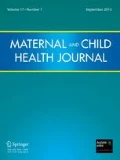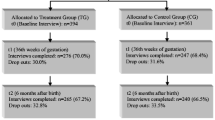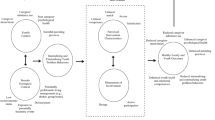Abstract
Objectives To examine the association between intensity of home visits in early intervention (EI), perceived helpfulness of home visits in EI, and positive family relationships as predictors of maternal competence at age 3, as well as moderating effects of predictors, controlling for child characteristics, family demographics, and negative life events. Methods Data were drawn from the Early Intervention Collaborative Study (EICS), a 24-year longitudinal investigation of approximately 190 families of children with developmental disabilities who participated in EI programs in Massachusetts and New Hampshire. The primary analytic strategy was multivariable regression modeling. Each independent predictor was tested individually and then all together to build the final model. Interactions between independent predictors were also examined. Results After controlling for child and family characteristics and negative life events, the intensity of home visits was not significantly associated with maternal competence at age 3. However, the helpfulness of home visits (β = 2.94, S.E. = 1.12, p < .01) and positive family relationships (β = 5.11, S.E. = 1.08, p < .001) were associated with higher maternal competence when the child was 3 years old. Conclusions for Practice Recommendations for programs and policy include collecting life course data on families, particularly on their family relationships and experiences in EI and home visiting, assessing family relationships at the beginning of EI using a strengths-based perspective, and closely monitoring the quality of services.
Similar content being viewed by others
References
Abidin, R. (1995). Manual for the parenting stress index. Odessa, FL: Psychological Assessment Resources.
Achenbach, T. M. (1992). Manual for the child behavior checklist/2–3. Burlington, VT: University of Vermont, Department of Psychiatry.
Adams, R. C., & Tapia, C. (2013). Early intervention, IDEA part C services, and the medical home: Collaboration for best practice and best outcomes. Pediatrics, 132(4), e1073–e1088.
Azzi-Lessing, L. (2011). Home visitation programs: critical issues and future directions. Early Childhood Research Quarterly, 26(4), 387–398.
Bailey, D., & Powell, T. (2005). Assessing the information needs of families in early intervention. In M. J. Guralnick (Ed.), A developmental systems approach to early intervention: National and intervnational perspectives (pp. 151–183). Baltimore: Brookes.
Bailey, D. B., Nelson, L., Hebbeler, K., & Spiker, D. (2007). Modeling the impact of formal and informal supports for young children with disabilities and their families. Pediatrics, 120(4), e992–e1001.
Boller, K., Strong, D. A., & Daro, D. (2010). Home visiting: Looking back and moving forward. Zero to Three, 3(6), 4–9.
Conrad, B., Gross, D., Fogg, L., & Ruchala, P. (1992). Maternal confidence, knowledge, and quality of mother–toddler interactions: A preliminary study. Infant Mental Health Journal, 13, 353–362.
Department of Education. (2004). Individuals with Disabilities Education Act (IDEA) Part C: Infants and toddlers with disabilities, Pub. L. No. 108-446 § 631. Findings and Policy.
Donovan, W. L., & Leavitt, L. A. (1989). Maternal self-efficacy and infant attachment: Integrating physiology, perceptions, and behavior. Child Development, 60, 460–472.
Daro, D. (2010). Replicating evidence-based home visiting models: A framework for assessing fidelity. In Supporting evidence-based home visiting to prevent child maltreatment, Brief 3. Princeton, NJ: Mathematica Policy Research.
Dunst, C. J., Hamby, D. W., & Brookfield, J. (2007). Modeling the effects of carly childhood intervention variables on parent and family well-being. Journal of Applied Quantitative Methods, 2(3), 268–288.
Early Childhood Technical Assistance Center. (2016). Annual appropriations and number of children served under Part C of IDEA. Retrieved March 1, 2017, from http://ectacenter.org/partc/partcdata.asp.
Gondoli, D. M., & Silverberg, S. B. (1997). Maternal emotional distress and diminished responsiveness: the mediating role of parenting efficacy and parental perspective taking. Developmental Psychology, 33(5), 861–868.
Koball, H., Zaveri, H., Boller, K., Daro, D., Knab, J., et al. (2009). Supporting evidence-based home visiting to prevent child maltreatment: Overview of the cross-site evaluation. Children’s Bureau, Administration for Children and Families, U.S. Department of Health and Human Services. Princeton, NJ: Mathematica Policy Research.
Korfmacher, J., Green, B., Staerkel, F., Peterson, C., Cook, G., Roggman, L., et al. (2008). Parent involvement in early childhood home visiting. Child and Youth Care Forum, 37(4), 171–196.
Lightsey, J. O. R., & Sweeney, J. (2008). Meaning in life, emotion-oriented coping, generalized self-efficacy, and family cohesion as predictors of family satisfaction among mothers of children with disabilities. The Family Journal, 16(3), 212–221.
Moos, R., & Moos, B. (1981). Family environment scale. Palo Alto, CA: Consulting Psychologists Press.
Perry, A. (2004). A model of stress in families of children with developmental disabilities: Clinical and research applications. Journal on Developmental Disabilities, 11(1), 1–16.
Scheel, M. J., & Rieckmann, T. (1998). An empirically derived description of self-efficacy and empowerment for parents of children identified as psychologically disordered. American Journal of Family Therapy, 26(1), 15–27.
Shonkoff, J. P., Hauser-Cram, P., Krauss, M. W., Upshur, C. C., & Sameroff, A. J. (1992). Development of infants with disabilities and their families: Implications for theory and service delivery. Monographs of the Society for Research in Child Development, 57(6), i–163.
Spoth, R., & Conroy, S. (1993). Survey of prevention-relevant beliefs and efforts to enhance parenting skills among rural parents. The Journal of Rural Health, 9, 227–239.
Sweet, M. A., & Appelbaum, M. I. (2004). Is home visiting an effective strategy? A meta-analytic review of home visiting programs for families with young children. Child Development, 75(5), 1435–1456.
Teti, D. M., & Gelfand, D. M. (1991). Behavioral competence among mothers of infants in the first year: the mediational role of maternal self-efficacy. Child Development, 62(5), 918–929.
Turnbull, A. P., Summers, J. A., Turnbull, R., Brotherson, M. J., Winton, P., Roberts, R., et al. (2007). Family supports and services in early intervention: A bold vision. Journal of Early Intervention, 29(3), 187–206.
U.S. Office of Special Education Programs. (2010). Thirty-five years of progress in educating children with disabilities through IDEA. United States Department of Education. Retreived from https://www2.ed.gov/about/offices/list/osers/idea35/history/idea-35-history.pdf.
Warfield, M., Hauser-Cram, P., Wyngaarden Krauss, M., Shonkoff, J. P., & Upshur, C. C. (2000). The effect of early intervention services on maternal well-being. Early Education and Development, 11(4), 499–517.
Warfield, M. E. (1995). The cost-effectiveness of home visiting versus group services in early intervention. Journal of Early Intervention, 19(2), 130–148.
Warfield, M. E., Krauss, M. W., Hauser-Cram, P., Upshur, C. C., & Shonkoff, J. P. (1999). Adaptation during early childhood among mothers of children with disabilities. Journal of Developmental and Behavioral Pediatrics, 20(1), 9–16.
Washington, K., & Schwartz, I. S. (1996). Maternal perceptions of the effexts of physical and occupational therapy services on caregiving competency. Physical and Occupational Therapy in Pediatrics, 16(3), 33–54.
Acknowledgements
The Early Intervention Collaborative Study was funded by Grant No. R40 MC08956 through the U.S. Department of Health and Human Services, Health Resources and Services Administration, Maternal and Child Health Research Program. This project was also supported by grant number T32HS000063 from the Agency for Healthcare Research and Quality. The content is solely the responsibility of the authors and does not necessarily represent the official views of the Agency for Healthcare Research and Quality. Preparation of this manuscript was also supported by the Nancy Lurie Marks Family Foundation and the Lurie Institute for Disability Policy at Brandeis University.
Author information
Authors and Affiliations
Corresponding author
Ethics declarations
Conflict of interest
The authors declare that they have no conflict of interest.
Rights and permissions
About this article
Cite this article
Crossman, M.K., Warfield, M.E., Kotelchuck, M. et al. Associations Between Early Intervention Home Visits, Family Relationships and Competence for Mothers of Children with Developmental Disabilities. Matern Child Health J 22, 599–607 (2018). https://doi.org/10.1007/s10995-018-2429-x
Published:
Issue Date:
DOI: https://doi.org/10.1007/s10995-018-2429-x




